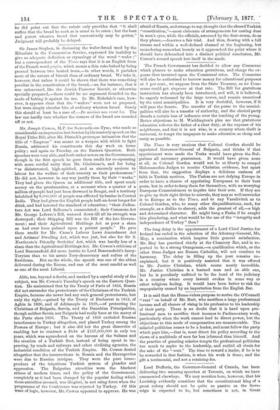Able, too, beyond a doubt, and marked by a careful
study of the subject, was Mr. Cowen's Tuesday's speech on the Eastern Ques- tion. He maintained that by the Treaty of Paris of 1856, Russia did not surrender the protectorate of the Christians of the Turkish Empire, because she never had any such general protectorate, but only the right,—gained by the Treaty of Bucharest in 1812, of Aghin in 1826, and of Adrianople in 1829,—of protecting the Christians of Bulgaria, Servia, and the Danubian Principalities, though neither Servia nor Bulgaria had really been at the mercy of the Porte since 1856. The Treaty of 1856 excluded Russian interference in Turkey altogether, and placed Turkey among the Powers of Europe ; but it also did her the great disservice of enabling her to contract a Debt of £157,000,000 in only ten years, which was squandered on the harems of the Sultans and the creation of a Turkish fleet, instead of being spent in im- proving, by roads and railways and other civilising agencies, the industrial condition of the Turkish Empire. Mr. Cowen denied altogether that the insurrections in Bosnia and the Herzegovina were due to Russian intrigue. They were the pure home- produce of the iniquitous Turkish system of plunder and oppression. The Bulgarian atrocities were the blackest crimes of modern times, and the policy of the Government, completely as it had been changed by the popular feeling which those atrocities aroused, was illogical, in not using force when the programme of the Conference was rejected by Turkey. Of this want of logic, however, Mr. Cowen appeared to approve. He was afraid of Russia, and strange to say, thought that the absurd Turkish "constitution,"—most elaborate of arrangements for casting dust in men's eyes, while the officials, screened by the dust-storm, do as they please,—deserves a fair trial. And thus, flowing with a full stream and within a well-defined channel at the beginning, but meandering somewhat loosely as it approached the point where it should have debouched into a distinct political conclusion, Mr. Cowen's second speech lost itself in the sands.






































 Previous page
Previous page